初中英语不规则形容词比较级和最高级
初中英语知识点归纳形容词的比较级和最高级
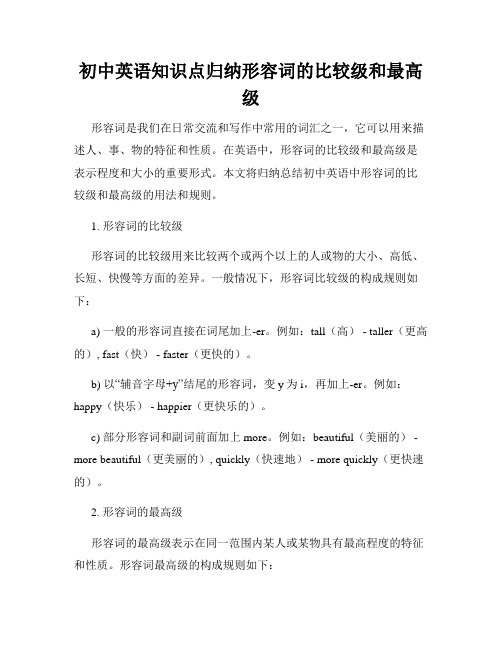
初中英语知识点归纳形容词的比较级和最高级形容词是我们在日常交流和写作中常用的词汇之一,它可以用来描述人、事、物的特征和性质。
在英语中,形容词的比较级和最高级是表示程度和大小的重要形式。
本文将归纳总结初中英语中形容词的比较级和最高级的用法和规则。
1. 形容词的比较级形容词的比较级用来比较两个或两个以上的人或物的大小、高低、长短、快慢等方面的差异。
一般情况下,形容词比较级的构成规则如下:a) 一般的形容词直接在词尾加上-er。
例如:tall(高) - taller(更高的), fast(快) - faster(更快的)。
b) 以“辅音字母+y”结尾的形容词,变y为i,再加上-er。
例如:happy(快乐) - happier(更快乐的)。
c) 部分形容词和副词前面加上more。
例如:beautiful(美丽的) - more beautiful(更美丽的), quickly(快速地) - more quickly(更快速的)。
2. 形容词的最高级形容词的最高级表示在同一范围内某人或某物具有最高程度的特征和性质。
形容词最高级的构成规则如下:a) 一般的形容词在词尾加上-est。
例如:big(大) - biggest(最大的), small(小) - smallest(最小的)。
b) 以“辅音字母+y”结尾的形容词,变y为i,再加上-est。
例如:happy(快乐) - happiest(最快乐的)。
c) 部分形容词和副词前面加上most。
例如:beautiful(美丽的) - most beautiful(最美丽的), quickly(快速地) - most quickly(最快速的)。
3. 形容词比较级和最高级的特殊形式有一些形容词的比较级和最高级形式是不规则的,需要牢记下来:a) good(好)- better(更好的)- best(最好的)b) bad(坏)- worse(更坏的)- worst(最坏的)c) many(多)- more(更多的)- most(最多的)d) little(少)- less(更少的)- least(最少的)4. 形容词比较级和最高级的用法形容词比较级和最高级在句子中的使用常用以下几种结构:a) 比较级 + than + 被比较对象。
初中英语语法形容词和副词的比较级和最高级简单记法
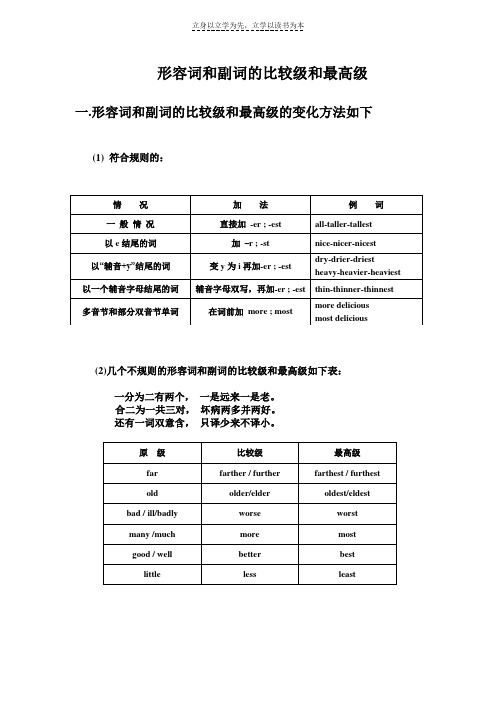
形容词和副词的比较级和最高级一.形容词和副词的比较级和最高级的变化方法如下(1) 符合规则的:(2)几个不规则的形容词和副词的比较级和最高级如下表:一分为二有两个,一是远来一是老。
合二为一共三对,坏病两多并两好。
还有一词双意含,只译少来不译小。
二.形容词和副词比较级的用法注意:有些形容词,如dead, empty, round, sure, woolen等受本身含义的限制,没有比较级。
例题解析1. He is ________ friends than I.A. much moreB. many moreC. very moreD. too more解析:后面有可数名词复数时,many的比较级形式为many more 修饰。
应选B.2. Which is the _________ country, Japan or Australia?A. more developedB. more developingC. most developedD. most developing解析:两者比较用比较级,表示"发达"用developed, 而developing 是"发展中的" 意思3. There were _______ shops in the city in 1982 than in 1990.A. littleB. fewC. fewerD. less解析:little 不能修饰可数名词,两者比较需用比较级,所以应选C.4. If you are not free today, come another day __________.A. tooB. soC. insteadD. yet解析:instead 作副词用时意为"代替,顶替",表示前面的事情没做,而是做了后面的事。
Instead一般位于句首。
应选C.5.He can't tell us ________, I think.A. important anythingB. anything importantC. important somethingD. something important.解析:不定代词与形容词联用需后置,否定句中应该用anything而不是something. 因此应选B6. The Huang River is the second __________ river in our country.A. longB. longerC. longestD. the longest解析:"定冠词the+ 序数词+ 形容词最高级" 表示"第几大……" 应选C.7. The light in the office wasn't ________for him to read.A. enough brightB. bright enoughC. brightlyD. enough brightly解析:enough修饰名词时可前可后,修饰形容词或副词时,要后置。
初中英语不规则形容词比较级和最高级
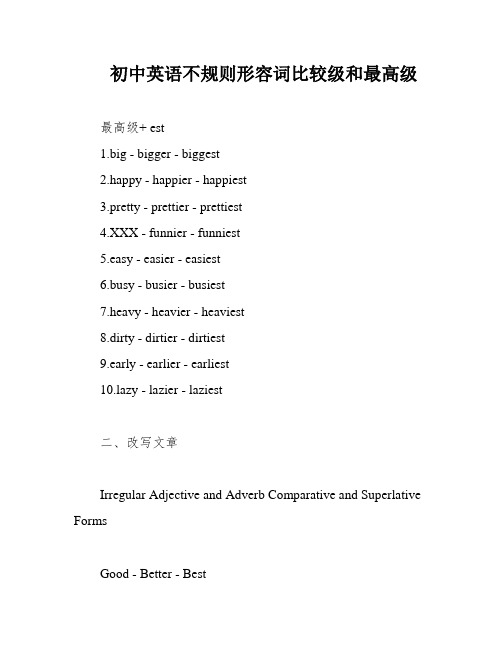
初中英语不规则形容词比较级和最高级最高级+ est1.big - bigger - biggest2.happy - happier - happiest3.pretty - prettier - prettiest4.XXX - funnier - funniest5.easy - easier - easiest6.busy - busier - busiest7.heavy - heavier - heaviest8.dirty - dirtier - dirtiest9.early - earlier - earliestzy - lazier - laziest二、改写文章Irregular Adjective and Adverb Comparative and Superlative FormsGood - Better - BestWell - Better - BestBad - Worse - WorstIll - Worse - WorstMany - More - MostMuch - More - MostFew - Less - LeastLittle - Less - LeastFar - Further - FurthestFar - Farther - FarthestOld - Older - OldestOld - Elder - EldestIt is XXX。
These forms are not created by simply adding "-er" or "-est" to the end of the word。
as with XXX.For example。
"good" es "better" in the comparative form and "best" in the superlative form。
初中英语知识点归纳比较级和最高级的形式
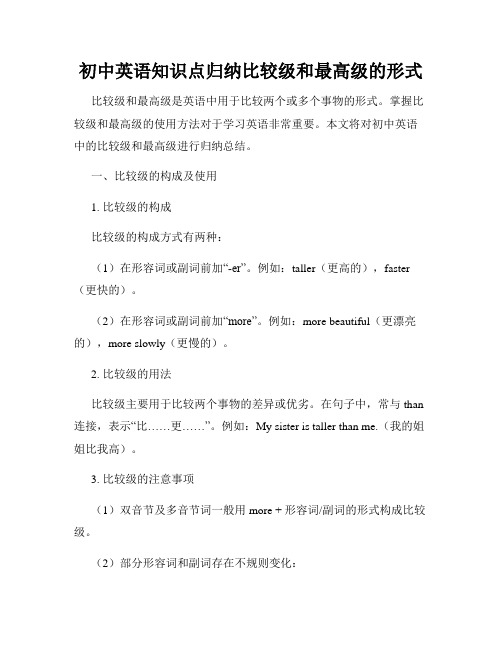
初中英语知识点归纳比较级和最高级的形式比较级和最高级是英语中用于比较两个或多个事物的形式。
掌握比较级和最高级的使用方法对于学习英语非常重要。
本文将对初中英语中的比较级和最高级进行归纳总结。
一、比较级的构成及使用1. 比较级的构成比较级的构成方式有两种:(1)在形容词或副词前加“-er”。
例如:taller(更高的),faster (更快的)。
(2)在形容词或副词前加“more”。
例如:more beautiful(更漂亮的),more slowly(更慢的)。
2. 比较级的用法比较级主要用于比较两个事物的差异或优劣。
在句子中,常与than 连接,表示“比……更……”。
例如:My sister is taller than me.(我的姐姐比我高)。
3. 比较级的注意事项(1)双音节及多音节词一般用more + 形容词/副词的形式构成比较级。
(2)部分形容词和副词存在不规则变化:- good(好的)→ better(更好的)- bad(坏的)→ worse(更差的)- little(小的)→ less(更少的)- well(好地)→ be tter (更好的)- much(多的)→ more(更多的)二、最高级的构成及使用1. 最高级的构成最高级的构成方式有两种:(1)在形容词或副词前加“-est”。
例如:tallest(最高的),fastest (最快的)。
(2)在形容词或副词前加“the most”。
例如:the most beautiful(最漂亮的),the most slowly(最慢的)。
2. 最高级的用法最高级主要用于三个或三个以上事物的比较,表示“最……”。
在句子中,可以使用介词in连接,并置于最高级形容词/副词之前。
例如:Tom is the tallest in our class.(汤姆是我们班最高的)。
3. 最高级的注意事项(1)双音节及多音节词一般用the most + 形容词/副词的形式构成最高级。
不规则比较级与最高级形容词总结

02
部分不规则
如“little-less-least”、“farfarther/further-farthest/furthest” 等,这些形容词的比较级和最高级形 式有一定的规律,但并非完全规则。
03
特殊不规则
如“many-more-most”、 “much-more-most”等,这些形容 词在构成比较级和最高级时需要使用 特殊的词汇“more”和“most”。
04
规则与不规则形容词比较级和最 高级用法辨析
规则形容词变化规则回顾
一般情况下,形容词比较级在词尾加-er,…
small - smaller - smallest。
以不发音的e结尾的形容词,比较级在词尾加…
large - larger - largest。
重读闭音节且以一个辅音字母结尾的形容词,…
least系列
little
least,表示“最小的”。
few
least(这里的least是few的最高级形式, 通过在few前加定冠词来构成),表示“最 少的”。
farthest/furthest系列
01
far
farthest(美国英语)或furthest(英国英语),表示“ 最远的”。
02
late
big - bigger - biggest。
以辅音字母加y结尾的形容词,变y为i,再…
happy - happier - happiest。
不规则形容词变化特点总结
不规则形容词的比较级和最高级形式不遵循上述规则,需要…
good - better - best,bad - worse - worst。
好的,其比较级为better,最高级为 best。
常用的不规则变化的形容词的比较级和最高级
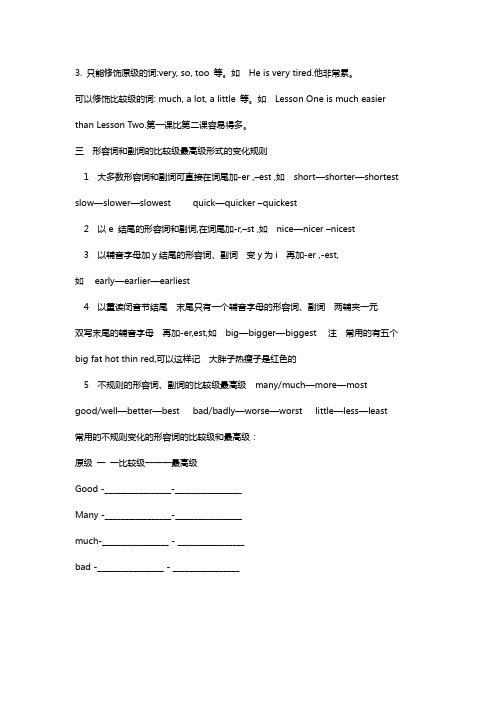
3. 只能修饰原级的词:very, so, too 等。
如He is very tired.他非常累。
可以修饰比较级的词: much, a lot, a little 等。
如Lesson One is much easier than Lesson Two.第一课比第二课容易得多。
三形容词和副词的比较级最高级形式的变化规则1大多数形容词和副词可直接在词尾加-er ,–est ,如short—shorter—shortest slow—slower—slowest quick—quicker –quickest2以e 结尾的形容词和副词,在词尾加-r,–st ,如nice—nicer –nicest3以辅音字母加y结尾的形容词、副词变y为i再加-er ,-est,如early—earlier—earliest4以重读闭音节结尾末尾只有一个辅音字母的形容词、副词两辅夹一元双写末尾的辅音字母再加-er,est,如big—bigger—biggest 注常用的有五个big fat hot thin red,可以这样记大胖子热瘦子是红色的5不规则的形容词、副词的比较级最高级many/much—more—mostgood/well—better—best bad/badly—worse—worst little—less—least 常用的不规则变化的形容词的比较级和最高级:原级一一比较级一一一最高级Good -_________________-_________________Many -_________________-_________________much-_________________ - _________________bad -_________________ - _________________五专项训练1写出下列形容词副词的比较级最高级。
young _______ _______ large _______ _______ far _______ _______easy _______ _______ much _______ _______ little _______ ______small _______ _______ late _______ _______ fat _______ _______busy _______ _______ red _______ _______ good _______ _______delicious ______________________________________ ________________________________ beautiful ________________________________ __________________________2用所给的形容词副词的适当形式填空。
初中英语形容词和副词的比较级和最高级
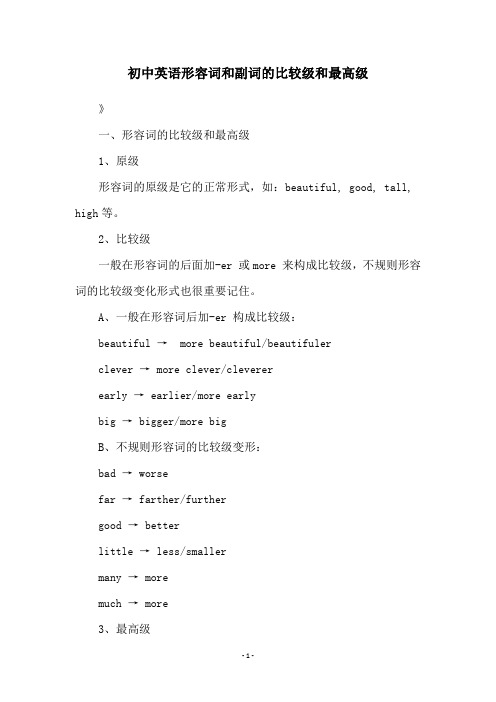
初中英语形容词和副词的比较级和最高级》一、形容词的比较级和最高级1、原级形容词的原级是它的正常形式,如:beautiful, good, tall, high等。
2、比较级一般在形容词的后面加-er 或more 来构成比较级,不规则形容词的比较级变化形式也很重要记住。
A、一般在形容词后加-er 构成比较级:beautiful → more beautiful/beautifulerclever → more clever/clevererearly → earlier/more earlybig → bigger/more bigB、不规则形容词的比较级变形:bad → worsefar → farther/furthergood → betterlittle → less/smallermany → moremuch → more3、最高级一般在形容词前面加the most 或者最高级的词本身来构成最高级。
A、在某些形容词前加the most来构成最高级:beautiful → the most beautifulclever → the most cleverearly → the earliestbig → the biggestB、不规则形容词的最高级变形:bad → the worstfar → the farthest/the furthestgood → the bestlittle → the least/the smallestmany → the mostmuch → the most二、副词的比较级和最高级1、原级副词的原级是它的正常形式,如:carefully, nicely, quickly, slowly等。
2、比较级一般在副词前加more 来构成比较级,不规则副词的比较级变化形式也很重要记住。
A、一般在副词前加more 来构成比较级:carefully → more carefullynicely → more nicelyquickly → more quicklyslowly → more slowlyB、不规则副词的比较级变形:well → betterbadly → worsefar → farther/further3、最高级一般在副词前加the most 来构成最高级。
初中英语不规则形容词比较级和最高级
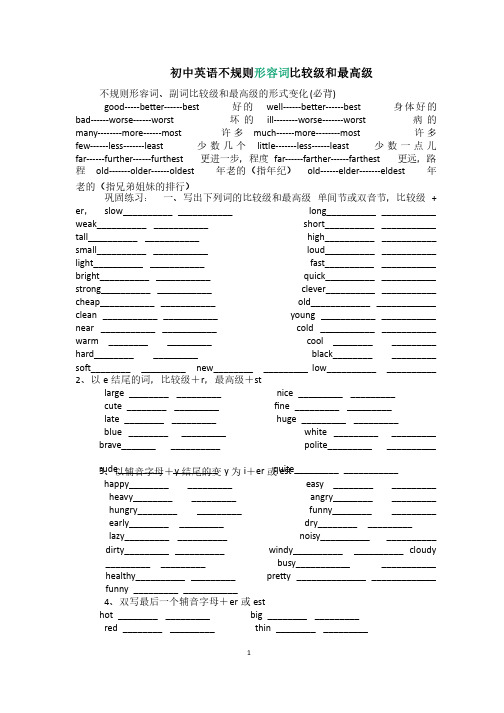
初中英语不规则形容词比较级和最高级不规则形容词、副词比较级和最高级的形式变化(必背) good-----be er------best 的好的 well------be er------best 的身体好的 bad------worse------worst 坏的 ill--------worse-------worst 病的 many--------more------most 许多 much------more--------most 许多 few------less-------least 少数几个 li le-------less------least 少数一点儿 far------further------furthest 更进一步,程度更进一步,程度 far------farther------farthest 更远,路程 old-------older------oldest 年老的(指年纪)年老的(指年纪) old------elder-------eldest 年老的(指兄弟姐妹的排行)老的(指兄弟姐妹的排行)巩固练习:巩固练习: 一、写出下列词的比较级和最高级 单间节或双音节,比较级单间节或双音节,比较级 + er , slow__________ slow__________ ___________ ___________ long__________ long__________ ___________ ___________ weak__________ ___________ short__________ ___________ tall__________ ___________ high__________ ___________ small__________ ___________ loud__________ ___________ light__________ ___________ fast__________ ___________ bright__________ ___________ quick__________ ___________ strong__________ ___________ clever__________ ___________ cheap___________ ___________ old____________ ____________ clean clean ___________ ___________ ___________ ___________ ___________ young young ___________ ___________ ___________ ___________ ___________ near ___________ ___________ cold ___________ ___________ warm ________ _________ cool ________ _________ hard________ _________ black________ _________ so ________ _________ new________ _________ _________ low__________ low__________ __________ 2、以e 结尾的词,比较级+r ,最高级+st large ________ _________ nice _________ _________ cute ________ _________ fine _________ _________ late ________ _________ huge _________ _________ blue ________ _________ white _________ _________ brave_______ __________ polite_________ __________ rude_________ _________ quite_________ ___________ 3、以辅音字母+y 结尾的变y 为i +er 或est happy________ _________ easy ________ _________ heavy________ _________ angry________ _________ hungry________ _________ funny________ _________ early________ _________ dry________ _________ lazy_________ __________ noisy__________ __________ dirty_________ dirty_________ __________ __________ windy__________ __________ __________ cloudy cloudy _________ _________ busy___________ ___________ healthy__________ healthy__________ _________ _________ pre y pre y ______________ ______________ ______________ _____________ _____________ funny _________ ___________ 4、双写最后一个辅音字母+er 或est hot ________ _________ big ________ _________ red ________ _________ thin ________ _________ fat ________ _________ wet ________ _________ 5、多音节和部分双音节、多音节和部分双音节 +more 构成构成比较级比较级,+the the most most 构成最高级构成最高级 例;例;beau ful ----- more beau ful ------ the most beau ful interes ng ________________ __________________ frightening ________________ __________________ exci ng ________________ __________________ slowly________________ __________________ happily________________ __________________ delicious ________________ __________________ expensive ________________ __________________ important ________________ __________________ careful ________________ __________________ difficult ________________ __________________ quickly________________ __________________ friendly ________________ __________________ handsome handsome ________________ ________________ __________________ 6、不规则、不规则形容词形容词比较级和最高级比较级和最高级good____________ ___________well________________ __________________ many________________ __________________ much________________ __________________ few________________ __________________ li le________________ __________________ old________________ __________________ old________________ __________________ bad________________ __________________ ill________________ ill________________ _______ _______ _______ far________________ far________________ __________________ 二、根据句意填入单词的正确形式。
初中英语语法:形容词副词比较最高级
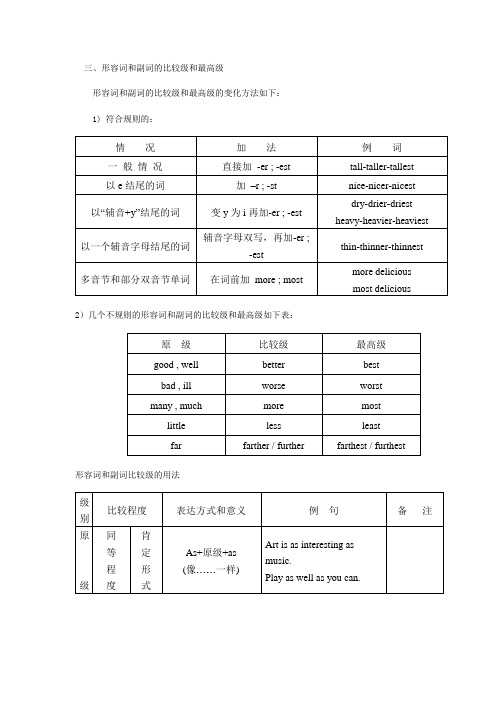
三、形容词和副词的比较级和最高级形容词和副词的比较级和最高级的变化方法如下:1) 符合规则的:2)几个不规则的形容词和副词的比较级和最高级如下表:形容词和副词比较级的用法注意:有些形容词,如 dead, empty, round, sure, woolen 等受本身含义的限制,没有比较级。
例题解析:举一反三,学的更轻松!He is ________ friends than I.A. much moreB. many moreC. very moreD. too more解析:后面有可数名词复数时, many的比较级形式为many more 修饰。
应选B.2. Which is the _________ country, Japan or Australia?A. more developedB. more developingC. most developedD. most developing解析:两者比较用比较级,表示"发达"用 developed, 而developing 是 "发展中的" 意思3.There were _______ shops in the city in 1982 than in 1990.A. littleB. fewC. fewerD. less解析:little 不能修饰可数名词,两者比较需用比较级,所以应选C.4. If you are not free today, come another day __________.A. tooB. soC. insteadD. yet解析:instead 作副词用时意为"代替,顶替",表示前面的事情没做,而是做了后面的事。
Instead一般位于句首。
应选C.5.He can't tell us ________, I think.A. important anythingB. anything importantC. important somethingD. something important.解析:不定代词与形容词联用需后置,否定句中应该用anything而不是something. 因此应选B6. The Huang River is the second __________ river in our country.A. longB. longerC. longestD. the longest解析:"定冠词the+ 序数词 + 形容词最高级 " 表示"第几大……" 应选C.7. The light in the office wasn't ________for him to read.A. enough brightB. bright enoughC. brightlyD. enough brightly解析:enough修饰名词时可前可后,修饰形容词或副词时,要后置。
中考英语复习之形容词比较级、最高级

中考英语复习之形容词比较级、最高级本期主题是比较级变形规则(含最高级)。
注:形容词是指用于描述人或事物的属性/状态/特征等的词汇。
我们知道,基于动词变形得到的过去式/过去分词等,其中含有与原词存在明显差异的新词,那么由形容词变形得到的比较级/最高级,同样会扩展出大量新词。
诸如:good-better-best(更好的/最好的),hot-hotter-hottest(更热的/最热的),quick-quicker-quickest(更快的/最快的)。
形容词比较级与最高级变形一、不规则变化的形容词1、bad - worse - worst(坏的)2、ill - worse - worst(有病的,坏的)3、far - farther - farthest(远的)注:多指距离上。
4、far - further - furthest(远的)注:多指程度上。
5、good - better - best(好的)6、well - better - best(健康的)7、many - more - most(多的)注:修饰可数名词。
8、much - more - most(多的)注:修饰不可数名词。
9、little - less - least(少的,小的)10、old - elder - eldest(年长的)注:不能译为“旧的”。
二、规则变化的形容词(一)、单音节以及少数双音节形容词,加-er和-est构成比较级与最高级。
1、bright - brighter - brightest(明亮的)2、broad - broader - broadest(广阔的)3、cheap - cheaper - cheapest(便宜的)4、clean - cleaner - cleanest(干净的)5、clever - cleverer - cleverest(聪明的)6、cold - colder - coldest(寒冷的)7、cool - cooler - coolest(凉的)8、dark - darker - darkest(黑暗的)9、dear - dearer - dearest(贵的)10、deep - deeper - deepest(深的)11、fast - faster - fastest(迅速的)12、few - fewer - fewest(少的)13、great - greater - greatest(伟大的)14、hard - harder - hardest(困难的,硬的)15、high - higher - highest(高的)16、kind - kinder - kindest(善良的)17、light - lighter - lightest(轻的)18、long - longer - longest(长的)19、loud - louder - loudest(响亮的)20、low - lower - lowest(低的)21、near - nearer - nearest(近的)22、new - newer - newest(新的)23、old - older - oldest(老的)24、poor - poorer - poorest(穷的)25、quick - quicker - quickest(快的)26、quiet - quieter - quietest(安静的)27、rich - richer - richest(富裕的)28、short - shorter - shortest(短的)29、slow - slower - slowest(慢的)30、small - smaller - smallest(小的)31、smart - smarter - smartest(聪明的)32、soft - softer - softest(柔软的)33、strong - stronger - strongest(强壮的)34、sweet - sweeter - sweetest(甜的)35、tall - taller - talles(高的)36、thick - thicker - thickest(厚的)37、warm - warmer - warmest(温暖的)38、weak - weaker - weakest(弱的)39、young - younger - youngest(年轻的)注:like(相似的)只能在前面加more和most。
形容词、副词比较级和最高级规律和不规则变化
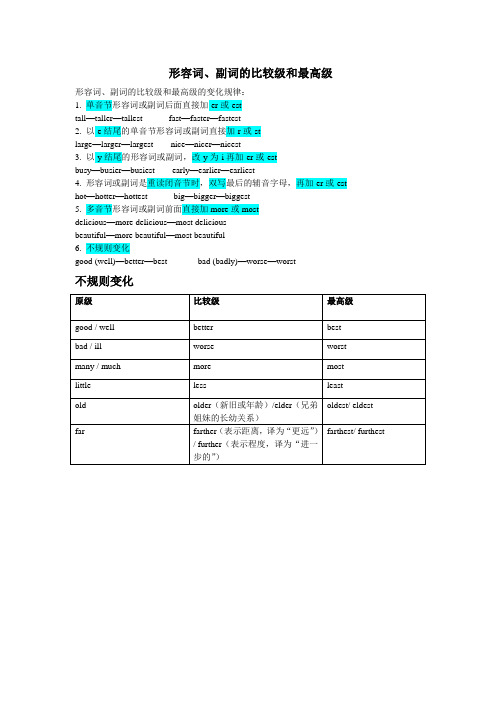
busy—busier—busiest early—earlier—earliest
4.形容词或副词是重读闭音节时,双写最后的辅音字母,再加-er或-est
hot—hotter—hottest big—bigger—biggest
5.多音节形容词或副词前面直接加more或most
better
best
bad / ill
worse
worst
many / much
more
most
little
less
least
old
older(新旧或年龄)/elder(兄弟姐妹的长幼关系)
oldeБайду номын сангаасt/ eldest
far
farther(表示距离,译为“更远”)/ further(表示程度,译为“进一步的”)
delicious—more delicious—most delicious
beautiful—more beautiful—most beautiful
6.不规则变化
good (well)—better—best bad (badly)—worse—worst
不规则变化
原级
比较级
最高级
good / well
形容词、副词的比较级和最高级
形容词、副词的比较级和最高级的变化规律:
1.单音节形容词或副词后面直接加-er或-est
tall—taller—tallest fast—faster—fastest
2.以-e结尾的单音节形容词或副词直接加-r或-st
large—larger—largest nice—nicer—nicest
初中英语知识点归纳形容词副词的比较级和最高级

初中英语知识点归纳形容词副词的比较级和最高级形容词和副词的比较级和最高级是初中英语学习中的重要知识点。
它们用于描述事物的程度、大小、速度等,并且在日常生活和书面表达中经常被使用。
在本文中,我将归纳总结形容词和副词的比较级和最高级的用法和构成规则,以便初中生对此有一个清晰的了解。
一、形容词的比较级和最高级用法1. 形容词的比较级用于比较两个人或事物的性质、状态、特征等。
构成方法如下:1) 单音节形容词和部分双音节形容词在后面加-er,如tall(高)- taller(更高)。
2) 以不发音的e结尾的形容词后面直接加-r,如nice(好看)- nicer (更好看)。
3) 以辅音字母+y结尾的形容词把y变为i,再加-er,如happy(快乐)- happier(更快乐)。
4) 大部分双音节形容词前面加more,如beautiful(美丽)- more beautiful(更美丽)。
例如:- My sister is taller than me.(我妹妹比我高。
)- This book is more interesting than that one.(这本书比那本书更有趣。
)2. 形容词的最高级用于比较三个或三个以上人或事物的性质、状态、特征等。
构成方法如下:1) 单音节形容词和部分双音节形容词在后面加-est,如tall(高)- tallest(最高)。
2) 以不发音的e结尾的形容词后面直接加-st,如nice(好看)- nicest(最好看)。
3) 以辅音字母+y结尾的形容词把y变为i,再加-est,如happy(快乐)- happiest(最快乐)。
4) 大部分双音节形容词前面加most,如beautiful(美丽)- most beautiful(最美丽)。
例如:- Tom is the tallest student in our class.(汤姆是我们班最高的学生。
)- This is the most delicious food I have ever tasted.(这是我尝过的最美味的食物。
- 1、下载文档前请自行甄别文档内容的完整性,平台不提供额外的编辑、内容补充、找答案等附加服务。
- 2、"仅部分预览"的文档,不可在线预览部分如存在完整性等问题,可反馈申请退款(可完整预览的文档不适用该条件!)。
- 3、如文档侵犯您的权益,请联系客服反馈,我们会尽快为您处理(人工客服工作时间:9:00-18:30)。
初中英语不规则形容词比较级和最高级不规则形容词、副词比较级和最高级的形式变化(必背)good-----better------best 好的well------better------best 身体好的bad------worse------worst 坏的ill--------worse-------worst 病的many--------more------most 许多much------more--------most 许多few------less-------least 少数几个little-------less------least 少数一点儿far------further------furthest 更进一步,程度far------farther------farthest 更远,路程old-------older------oldest 年老的(指年纪)old------elder-------eldest 年老的(指兄弟姐妹的排行)巩固练习:一、写出下列词的比较级和最高级单间节或双音节,比较级+ er,slow__________ ___________ long__________ ___________ weak__________ ___________ short__________ ___________ tall__________ ___________ high__________ ___________ small__________ ___________ loud__________ ___________ light__________ ___________ fast__________ ___________ bright__________ ___________ quick__________ ___________ strong__________ ___________ clever__________ ___________ cheap___________ ___________ old____________ ____________ clean ___________ ___________ young ___________ ___________ near ___________ ___________ cold ___________ ___________ warm ________ _________ cool ________ _________ hard________ _________ black________ _________ soft________ _________ new________ _________ low__________ __________ 2、以e结尾的词,比较级+r,最高级+stlarge ________ _________ nice _________ _________cute ________ _________ fine _________ _________late ________ _________ huge _________ _________blue ________ _________ white _________ _________ brave_______ __________ polite_________ __________ rude_________ _________ quite_________ ___________3、以辅音字母+y结尾的变y为i+er或esthappy________ _________ easy ________ _________ heavy________ _________ angry________ _________ hungry________ _________ funny________ _________ early________ _________ dry________ _________lazy_________ __________ noisy__________ __________ dirty_________ __________ windy__________ __________ cloudy _________ _________ busy___________ ___________ healthy__________ _________ pretty ______________ _____________ funny _________ ___________4、双写最后一个辅音字母+er或esthot ________ _________ big ________ _________red ________ _________ thin ________ _________fat ________ _________ wet ________ _________5、多音节和部分双音节+more构成比较级,+the most构成最高级例;beautiful -----more beautiful ------the most beautiful interesting ________________ __________________ frightening ________________ __________________ exciting ________________ __________________ slowly________________ __________________ happily________________ __________________ delicious ________________ __________________ expensive ________________ __________________ important ________________ __________________ careful ________________ __________________ difficult ________________ __________________ quickly________________ __________________ friendly ________________ __________________ handsome ________________ __________________6、不规则形容词比较级和最高级good____________ ___________well________________ __________________ many________________ __________________ much________________ __________________ few________________ __________________ little________________ __________________ old________________ __________________ old________________ __________________ bad________________ __________________ ill________________ _______ far________________ __________________二、根据句意填入单词的正确形式。
1.My brother is two years_______________ (old) than me. 2. Is your sister ______________ (young) than you? Yes, she is.3. Who is _______________ (thin),you or Helen? Helen is.4. Whose pencil-box is ____________ (big), yours or hers? Hers is. 5.Ben jumps ____________ (high) than some of the boys in his class. 6.Does Nancy sing _______________ (well) than Helen? Yes, she does. 7.My eyes are _______________(big) than hers. 8.Which is _______________ (heavy), the elephant or the pig? 9.Who gets up ______________ (early), Tim or Tom? 10.Do the girls get up____________(early) than the boys? No, they _______ _____. 11.Jim runs ___________ (slow). But Ben runs ___________(slow). 12. The Earth is ___________ (big) than the moon. 13. The sun is ____________ (bright) than the other stars. 14. John is strong this year. He is ___________ (strong) than last year. 15. Lhasa is _______ __________ (high) city in China. 16. John is one of ________ __________ (tall) and ____________ (heavy) students. 17. Today is _________ than yesterday. 18. Mount Qomolangma is __________ ____________ (high) mountain in the world. 19. My dog is _________ (small). Your dog is _________ (big). My dog is _________ (small) than yours. 20. This game is ___________ ____________ (interesting) than that game. 21. Noodles are ___________ _____________ (delicious) than bread. 22. Chinese is _________ ______________ (difficult) than English. 23. My skirt is _________ ______________ (expensive) than hers. 24. Shenzhen is one of _______ _________ ___________(beautiful) cities in China. 25. Monkey King is one of _____ _______ _____________(exciting) stories. 26. She is _____ _______ ___________ (careful) girl in our class.。
